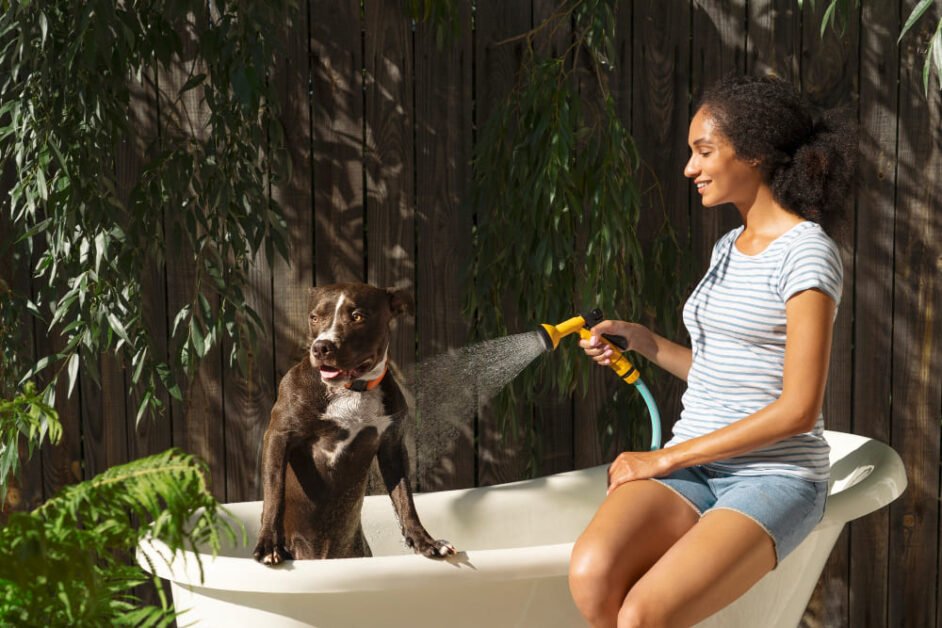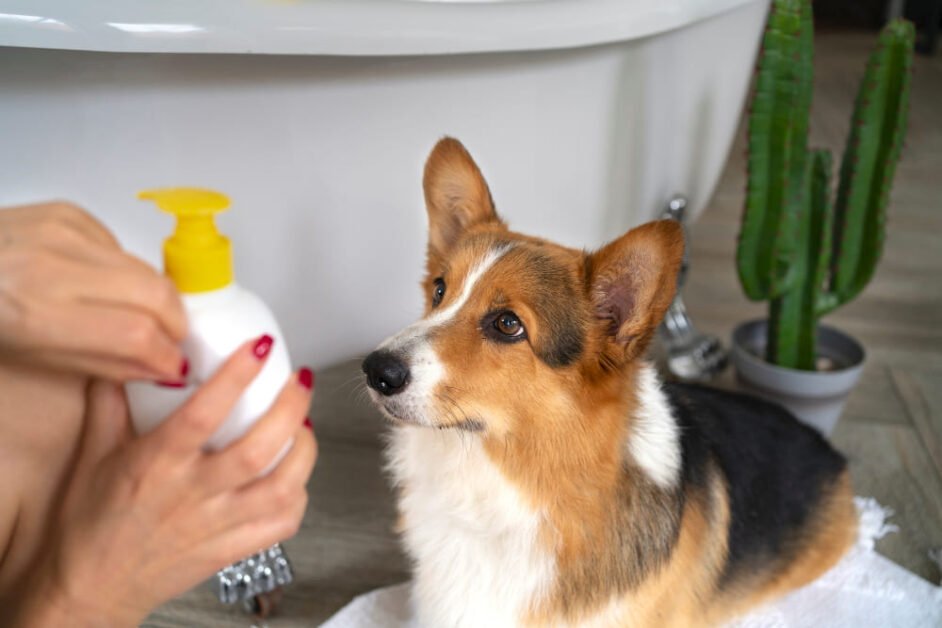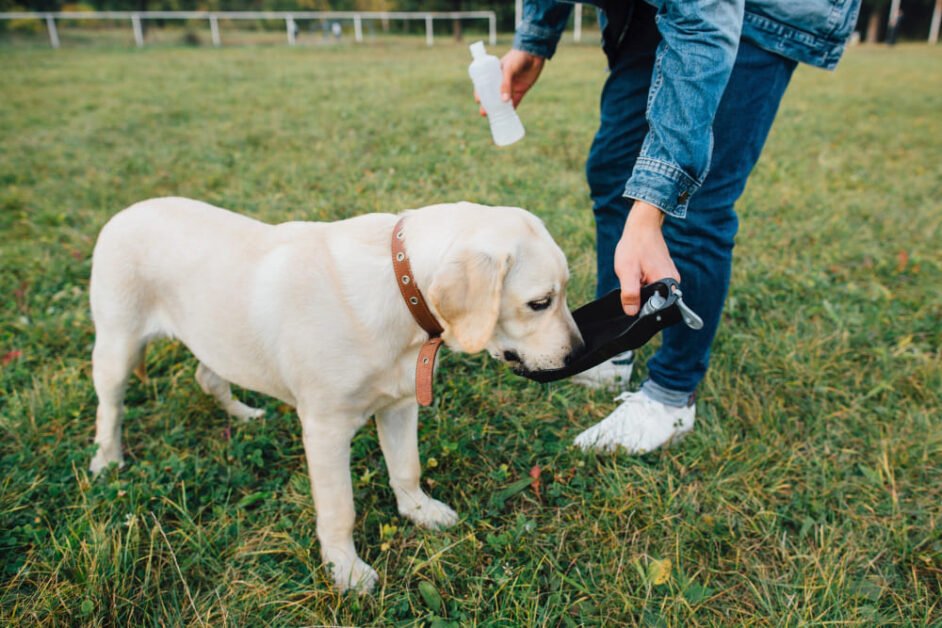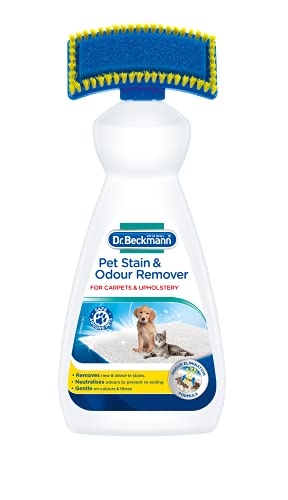Ever experienced the dreadful smell of a skunk on your beloved dog? It’s a nightmare for any pet owner!
In this guide, we’ll show you the most effective remedies and tips to eliminate that pungent skunk odor from your furry friend. From DIY home solutions to store-bought products, we’ve got all the information you need to bring back your dog’s fresh scent.
Discover step-by-step instructions and expert advice to ensure your dog is skunk-free in no time.Whether it’s a late-night skunk encounter or a curious pup’s daytime mishap, you’ll be prepared to handle it.
Read on to find out how to rescue your dog from the stink and restore their fluffy freshness. No more holding your nose or keeping your pet at arm’s length. With our comprehensive guide, you’ll be ready to tackle any skunk-related emergency. I hope you find this introduction captivating! If you need any more help or details, just let me know. 😊
Table of Contents
Why do dogs smell?
Dogs have a unique and unmistakable scent, which can be both endearing and sometimes unpleasant. Understanding why dogs smell can help you address any issues and ensure your furry friend stays fresh.
Natural Oils and Skin Conditions
Dogs produce natural oils, known as sebum, to keep their skin and coat healthy. Sebum can accumulate and create a musty odor, especially in breeds with oily skin or thick coats. Skin conditions like allergies, infections, or parasites can also cause dogs to emit a stronger smell.
Anal Glands
Dogs have anal glands that secrete a foul-smelling liquid used for marking territory. Occasionally, these glands can become full or infected, leading to an unpleasant odor. Regular vet check-ups can help manage this issue.
Diet and Digestion
A dog’s diet plays a significant role in their overall scent. Low-quality food can cause digestive issues and bad breath. Feeding your dog a balanced, nutritious diet can help minimize odor from within.
Environmental Factors
Dogs love exploring and often roll in various outdoor elements like grass, mud, and even dead animals. These adventures can leave them with lingering smells. Regular grooming and baths can help remove external odors.
Ear Infections
Dogs with floppy ears or those prone to ear infections can develop a distinct smell. Ear infections often cause a yeasty or rotten odor. Keeping your dog’s ears clean and dry can prevent these infections.
Dental Health
Bad breath is a common issue in dogs and can be a sign of dental problems. Regular brushing and dental check-ups can help maintain good oral hygiene and reduce bad breath.
Understanding why skunks spray and how to prevent it

Skunks are notorious for their pungent odor, and understanding why they spray can help us prevent such encounters with our furry friends. Skunks spray as a defense mechanism when they feel threatened or scared. They have scent glands located near their anus, which produce a foul-smelling liquid containing sulfur compounds. When the skunk feels threatened, it aims its backside towards the target and releases the spray, accurately targeting its victim.
Skunks are most active during the evening and early morning hours.
Limit your dog’s outdoor time during these periods or closely supervise them.
Ensure trash cans are tightly sealed to avoid attracting skunks.
Avoid leaving pet food or other odorous items outside.
If your dog is curious or prone to surprising skunks, install motion-activated lights or sprinklers in areas like gardens to deter skunks from entering your property.
The importance of acting quickly after your dog gets sprayed by a skunk
Time is of the essence when it comes to dealing with skunk spray on your furry friend. The sooner you act, the better chance you have of minimizing the odor and preventing any potential skin irritations or infections. Skunk spray is notorious for its pungent odor, but it can also cause physical discomfort to your dog. Acting quickly can help alleviate these symptoms and ensure your pup is back to their happy, odor-free self in no time.
Isolate Your Dog:
- Keep your dog outdoors or in a well-ventilated area to avoid spreading the skunk odor to furniture or surfaces.
- This helps contain the smell and makes the cleaning process more manageable.
Examine Your Dog:
- Carefully check areas that may have come into direct contact with the skunk spray, such as the face and paws.
- These sensitive areas may need extra care during cleaning.
Act Quickly:
- In dogs with longer fur, the skunk spray can become deeply embedded, making it harder to remove.
- Address the issue immediately to prevent the odor from becoming ingrained in the fur and skin, reducing frustration and discomfort for both you and your dog.
Remember, time is of the essence when it comes to dealing with skunk spray. Acting promptly by isolating your dog, examining them thoroughly, and beginning the cleaning process will help ensure a faster and more effective removal of the skunk odor. Don’t waste any time and get started on ridding your furry friend of that unmistakable skunk smell.
Natural remedies to remove skunk smell from your furry friend

Tomato Juice Bath:
- The acidity in tomato juice helps neutralize the skunk odor.
- Pour tomato juice over your dog’s coat and massage it in thoroughly.
- Leave the juice on for a few minutes before rinsing it off with warm water.
- Check with your veterinarian before use to ensure tomato juice is safe for your dog’s breed.
Baking Soda, Hydrogen Peroxide, and Dish Soap Mixture:
- This combination effectively breaks down skunk spray compounds and eliminates the odor.
- Mix:
- 1 quart of hydrogen peroxide
- ¼ cup of baking soda
- 1 teaspoon of dish soap
- Dampen your dog’s coat with warm water, then apply the solution thoroughly.
- Let the mixture sit for about five minutes before rinsing it off completely.
- Avoid contact with your dog’s eyes and prevent ingestion, as hydrogen peroxide can be harmful in large quantities.
Simple steps to take before attempting to remove skunk smell
Preparation is key when it comes to removing skunk smell from your furry friend. Before diving into the process, there are a few simple steps you should take to ensure a smoother and more effective skunk odor removal experience.
Skunk sprays can be distressing for dogs.
Help your dog relax by providing reassurance and soothing words.
Check your dog for signs of irritation, especially around the eyes, mouth, and nose.
Look for redness, swelling, or distress.
If you notice anything unusual, consult with a veterinarian.
Put on gloves and protective clothing before starting the odor removal process.
Skunk spray can cling to fur and transfer to your skin, so these precautions help prevent you from getting the smell on yourself.
By taking these simple steps before attempting to remove skunk smell, you can ensure that you and your furry friend are prepared and ready for a successful odor removal process. Remember, being calm, checking for any potential issues, and wearing protective gear are essential elements of this preliminary stage.
Using household items to create an effective skunk odor removal solution
One of the most effective and cost-efficient ways to remove skunk odor from your furry friend is by using household items that you likely already have in your pantry.
Baking Soda, Hydrogen Peroxide, and Dish Soap Solution:
- Ingredients:
- 1 quart of hydrogen peroxide
- 1/4 cup of baking soda
- 2 teaspoons of liquid dish soap
- Function:
- Baking Soda: Neutralizes the odor.
- Hydrogen Peroxide: Acts as a powerful cleaning agent.
- Dish Soap: Breaks up the oily skunk spray.
- Instructions:
- Mix the ingredients in a large bowl.
- Use the solution immediately as it loses effectiveness over time.
- Apply thoroughly to your dog’s fur, avoiding the eyes.
- Rinse well with warm water.
Apple Cider Vinegar Solution:
- Ingredients:
- Apple cider vinegar
- Water (dilute in a 1:1 ratio)
- Function:
- Apple cider vinegar is a natural deodorizer that helps neutralize skunk odor.
- Instructions:
- Dilute apple cider vinegar with water.
- Pour or spray the mixture onto your dog, focusing on areas with the most skunk spray, like the head, neck, and back.
- Massage thoroughly into the fur.
- Let it sit for a few minutes, then rinse with warm water.
- Repeat as necessary until the odor is eliminated.
By utilizing these common household items, you can create effective skunk odor removal solutions that are safe for your furry friend and easy on your wallet. However, keep in mind that each dog may react differently to these remedies, so it’s important to monitor your pet for any signs of irritation or discomfort. If your dog experiences any adverse reactions, discontinue use immediately and consult with your veterinarian for further advice.
Gentle and safe shampoos specifically designed for skunk odor removal

When it comes to removing skunk odor from your furry friend, choosing the right shampoo is crucial. Gentle and safe shampoos specifically designed for skunk odor removal can make a world of difference in eliminating the stubborn scent and ensuring your dog is fresh and clean once again.
Formulation:
- These shampoos are crafted with ingredients that effectively neutralize skunk odor without harming your dog’s skin or coat.
- They are gentle yet powerful, making them suitable for all breeds and sizes.
For Labrador Retrievers:
- Labradors, known for their love of exploration, may encounter skunks more often.
- Their dense double coat can hold onto the skunk smell, making it difficult to remove.
- Specialized shampoos are designed to penetrate deep into the fur, breaking down the odor at a molecular level.
For Dachshunds:
- Dachshunds, with their inquisitive nature, can easily get sprayed by skunks.
- Their short, dense coat requires a shampoo that is both safe and effective in removing the potent skunk smell.
- These shampoos target the specific compounds in skunk spray while addressing the needs of different dog breeds.
Additional Benefits:
- These shampoos often contain moisturizing agents that nourish the dog’s skin and coat during the bathing process.
- They are easy to lather and rinse, ensuring a hassle-free experience for both you and your pet.
So, when you’re faced with the challenge of removing skunk odor from your furry friend, reach for a gentle and safe shampoo specifically designed for skunk odor removal. Your dog will thank you for it!
- Made in the USA – Our oatmeal formula pet shampoo is pH balanced, alcohol free, paraben free, PEG-80 free and is highly …
- Oatmeal Formula – This coconut lime verbena scented pet shampoo is great for moisturizing dry skin, cleaning dirty coats…
- Less is More – Wahl has a higher concentrate of coconut derived sodding agent, which means you don’t have to use as much…

- Veterinarian Certified: Pawfume’s veterinary formula dog shampoo and conditioner will be a non-negotiable in your collec…
- Professionally Formulated: Pamper your pet with one of the best professional dog shampoo conditioner options in the mark…
- Detangling Dog Shampoo: Not only is this a dog shampoo that smells good & a dog conditioner, its also a dog conditioner …












- HELPS SUPPORT HEALTHY SKIN – With a wash and soaking of the coat for 5-10 minutes, our powerful ingredients work to help…
- FAST ACTING – Works fast to soothe your pet’s sensitive skin that may be affected by environmental stressors.
- VET-RECOMMENDED – This pet shampoo is pH balanced for your pet’s skin and is paraben and soap-free to promote overall sk…












- DOG SKIN VS. HUMAN SKIN – Dogs’ skin has a higher pH, so human shampoos can be harmful. This tearless puppy shampoo keep…
- SOOTHES AND CLEANS – This puppy shampoo for puppies 8+ weeks old is fragrance-free, with naturally derived buttermilk an…
- HIGHEST QUALITY NATURALLY DERIVED INGREDIENTS– Safe & gentle dog and puppy shampoo with 95%+ natural origin formulas, fo…












Proper bathing techniques to get rid of skunk smell
Bathing your furry friend after a run-in with a skunk is crucial to eliminate the lingering odor. However, it’s important to remember that proper bathing techniques can make all the difference in effectively getting rid of that stubborn skunk smell. So, let’s dive right in and explore the tried-and-true methods to wash away that pungent aroma.
Preparation:
- Protective Gear: Wear gloves and eyewear to protect yourself from irritation caused by the skunk spray.
- Supplies:
- Dog-friendly skunk odor removal shampoo.
- Towels.
- A bucket or hose for rinsing.
- Treats or toys to reward your dog for cooperation.
Wetting the Coat:
- Thoroughly wet your dog’s coat.
- Avoid getting water directly on their face initially, as sensitive areas like the eyes, nose, and ears need extra caution.
Applying Shampoo:
- Lather your dog with the skunk odor removal shampoo, focusing on the areas most affected by the skunk spray.
- Gently massage the shampoo into their fur to break down the odor-causing oils.
- For dogs with longer or thicker coats, use a brush or comb to ensure the shampoo reaches deeper layers of the fur.
Tips for applying skunk odor removal products effectively
When it comes to applying skunk odor removal products on your furry friend, it’s important to do it effectively to get rid of that pungent smell. One tip is to start with a small test spot on your dog’s fur before applying the product all over. This will help you ensure that your pet doesn’t have any adverse reactions to the product. Keep an eye out for any signs of irritation, such as excessive scratching or redness. Remember, different dog breeds may have different sensitivities, so it’s crucial to be cautious.
Ensure the skunk odor removal product is safe for your dog’s use.
Focus on areas directly sprayed by the skunk (e.g., face, neck, tail).
Gently massage the product into your dog’s fur, working it down to the skin for deep penetration and effective odor neutralization.
Avoid contact with your dog’s eyes and mouth.
Use cotton balls or a soft cloth to protect these sensitive areas during the application.
Carefully follow the product instructions for best results.
Be patient throughout the process to ensure thorough treatment.
- It’s Not Water: Pooph is totally fragrance free because it eliminates odor instead of covering it up! Pooph contains no …
- Risk-Free Guarantee: Try POOPH for 30 days and if you aren’t happy, simply return it for a 100% no-hassle refund. Just s…
- Instant & Safe: Instantly and safely freshens and dismantles puppy, dog, cat, pet, and litter urine and feces odors on a…












- Powerful – A little goes a long way with the Angry Orange pet odor eliminator for home use. It’s a carpet deodorizer tha…
- Citrus Scent – Derived from fresh orange peels, our carpet cleaner for pets smells like heaven and works like hell on st…
- Ready to Use – This bottle of urine odor eliminator can be used directly on cat pee or dog waste. No mixing required!












- Certified Gentle And Safe: Chlorine free and color safe; Safe to use around pets and children; No hazardous propellants,…
- Eliminates Stains, Odors and Residue: If it’s gross, it’s gone; Not just the stain, but the stink; From stinky yellow pe…
- Every Surface, Every Time: For use on carpets, floors, furniture, clothing, litter boxes, kennels, carriers, all pet liv…












- Use What the Pros Use: Thornell is the top provider of pet smell odor eliminator products to the veterinary industry in …
- Tough on Odors: Use this pet odor remover to permanently and immediately remove odors in the first application, saving y…
- Not an Enzyme, not a Mask: Our dog and cat odor eliminator features a unique non-enzymatic formula that works regardless…












The role of vinegar and hydrogen peroxide in neutralizing skunk odor
Vinegar and hydrogen peroxide are two commonly used ingredients in homemade skunk odor removal solutions. They play a crucial role in neutralizing the unpleasant smell that skunk spray leaves on your furry friend.
Vinegar:
- Function: Breaks down sulfur compounds in skunk spray that cause the pungent smell.
- Effectiveness: Neutralizes the skunk odor by targeting these compounds.
Hydrogen Peroxide:
- Function: Acts as a natural deodorizer and bleach.
- Effectiveness: Helps remove skunk smell and any staining caused by the spray.
Homemade Solution:
- Combine vinegar, hydrogen peroxide, and a gentle soap or dishwashing liquid to create a powerful skunk odor removal solution.
Application Cautions:
- Dilution: Properly dilute vinegar and hydrogen peroxide before use.
- Patch Test: Perform a patch test on a small area of your dog’s fur to check for any adverse reactions, especially for breeds with sensitive skin, such as Yorkshire Terriers or Dalmatians.
How to handle sensitive areas such as the face and eyes during the skunk smell removal process
When it comes to removing skunk smell from your dog’s sensitive areas like the face and eyes, it is crucial to exercise caution and take extra measures to ensure your furry friend’s safety. Skunk spray can cause a lot of discomfort and irritation, particularly if it gets into your dog’s eyes or comes into contact with delicate facial tissues.
- If Skunk Spray Contacts the Eyes:
- Immediate Action: Flush the eyes with copious amounts of fresh water.
- Technique: Gently hold your dog’s head still and use a clean cloth or cotton pad soaked in lukewarm water to wipe away traces of the skunk spray.
- Avoid: Do not rub the eyes as it may worsen irritation.
- Veterinary Care: Seek veterinary attention immediately if there is sustained redness, swelling, or extreme discomfort.
- Removing Skunk Smell from the Face:
- Preparation: Use a mild skunk odor removal solution, such as a mixture of hydrogen peroxide, baking soda, and dish soap.
- Application:
- Apply the solution carefully onto your dog’s face using a sponge or cloth.
- Avoid the areas around the eyes to prevent irritation.
- Technique: Gently massage the solution into your dog’s fur, focusing on areas most affected by the skunk spray.
It is important to be patient and thorough during this process. However, at all times, remember to avoid the facial area close to the eyes to minimize the risk of irritation or discomfort for your dog.
The importance of thoroughly rinsing your dog after using skunk odor removal products
Thoroughly rinsing your dog after using skunk odor removal products is an essential step to ensure your furry friend is clean and fresh. After all, the last thing you want is for your dog to smell like a mix of skunk and chemicals. It’s crucial to follow this step to avoid any potential skin irritations or discomfort for your pet.
When it comes to rinsing your dog, start by using lukewarm water to wet their fur thoroughly. Use a gentle dog shampoo, preferably one specifically designed for skunk odor removal. Gently massage the shampoo into their fur, making sure to reach all the affected areas. Pay extra attention to areas that are more susceptible to retaining the skunk smell, such as the face, head, tail, and paws.
As you rinse your dog, ensure that you are thorough in removing all traces of the skunk odor removal product. This is especially important because some skunk odor removal products can leave residue if not completely rinsed off. Leaving residue on your dog’s coat can cause skin irritations and may even attract dirt and debris, which can lead to further discomfort. Additionally, thoroughly rinsing your dog will help to restore their natural oils and maintain a healthy coat.
Avoiding common mistakes when trying to remove skunk smell
Common mistakes can hinder your efforts in effectively removing skunk smell from your dog.
Neglecting to Act Quickly:
- Importance: Immediate action is crucial as skunk spray’s sulfur-based compounds can penetrate fur and skin.
- Timing: The longer you wait, the harder it will be to eliminate the odor.
Attempting to Mask the Odor:
- Common Mistake: Using perfumed dog shampoos or air fresheners may temporarily cover the smell but will not eliminate it.
- Solution: Use products specifically designed for skunk odor removal that break down sulfur compounds.
Using Harsh Chemicals:
- Avoid: Do not use bleach or ammonia as they can be harmful to your dog’s skin and respiratory system.
- Recommendation: Stick to natural and safe alternatives to ensure your dog’swell-being.
Other effective alternatives to remove skunk smell from your dog
Natural remedies are not the only options when it comes to removing skunk smell from your beloved furry friend. There are other effective alternatives that can help you eliminate that pungent odor and restore your dog’s fresh scent.
Activated Charcoal:
- Function: Absorbs skunk odor molecules from the coat.
- Application:
- Sprinkle activated charcoal powder on your dog’s coat.
- Gently massage it in and let it sit for a few minutes.
- Brush it out thoroughly to remove the charcoal and odor.
Tomato Juice:
- Function: Contains enzymes that break down the oil in skunk spray.
- Application:
- Douse your dog’s coat thoroughly with tomato juice.
- Allow it to sit for about 10 minutes.
- Rinse your dog thoroughly with water.
- Note: Tomato juice can stain light-colored fur, so it’s best used on darker-coated dogs.
- Quickly removes odors left behind by urine, stool, vomit and other organic matter
- Safe for use on grass, artificial turf, gravel, concrete, brick and more
- Uses powerful, natural enzymes to eliminate odors at the source rather than cover them up












- Unique 2 in 1 brush head for residue-free carpet cleaning, removing new and dried-in stains while gentle on colours and …
- The fast-acting oxy-powered formula eliminates even the most stubborn of stains caused by cats and dogs residue-free and…
- Special ingredients target and neutralise odours: Even the strongest smells such as cat urine are removed effectively.
- SPOT STAIN & ODOR REMOVER: Begins to break down and remove stains immediately on contact.
- LIGHT CITRUS SCENT: Dog odor control formula gets your home smelling clean again.
- ENZYMATIC FORMULA: Continues working as long as any bio-based mess is still present.












- Completely Eliminate Odors & Stains: Our ready-to-use Advanced Pet Odor Eliminator Sprays target the source of animal me…
- Bio Enzymatic Odor Destroyer: ACTIVE Pet Stain and Odor Remover Formula is specially made with Enzymes and Natural Probi…
- Professional Stain Removal: ACTIVE Enzyme Cleaners will easily get rid of mess and set-in stains in Carpets, Fabric, Flo…












Tips for preventing future skunk encounters and potential sprays
Skunk encounters can be a smelly and unpleasant experience for both you and your furry friend. But fear not, there are some simple steps you can take to prevent future skunk encounters and potential sprays.
- Secure Trash Bins:
- Action: Use tight-fitting lids or store bins in enclosed areas.
- Purpose: Prevent skunks from accessing food scraps and garbage.
- Maintain Your Yard:
- Action:
- Regularly mow the lawn.
- Trim bushes and tidy up woodpiles.
- Purpose: Eliminate potential hiding spots for skunks.
- Action:
- Install Deterrents:
- Action: Use motion-activated lights or sprinkler systems.
- Purpose: Startle skunks and discourage them from visiting your property.
- Manage Dog Behavior:
- Action:
- Keep your dog on a leash during walks.
- Monitor their behavior in outdoor areas.
- Consider obedience training for commands like “leave it” or “come.”
- Purpose: Reduce the risk of skunk encounters, especially for breeds prone to pursuing small animals.
- Action:
By implementing these preventative measures and being proactive in managing your dog’s behavior, you can significantly reduce the chances of future skunk encounters and potential sprays. However, it’s important to remember that skunks are unpredictable creatures, and even with the best precautions, there may still be a possibility of encountering one. In the unfortunate event that your dog does get sprayed, it’s vital to act quickly and take the necessary steps to remove the skunk smell effectively, which we will discuss further in the following sections.
FAQs
Why do skunks spray?
Skunks spray as a defense mechanism when they feel threatened. The foul-smelling liquid they release helps ward off predators and potential threats.
How can I prevent my dog from getting sprayed by a skunk?
To prevent skunk encounters, make sure your garbage cans are secure, eliminate any potential hiding spots in your yard, and keep your dog on a leash during walks. Additionally, avoid leaving food or pet bowls outside overnight.
What should I do if my dog gets sprayed by a skunk?
Act quickly! First, keep your dog outside to prevent the skunk smell from spreading indoors. Then, follow the steps outlined in the article to remove the skunk smell from your furry friend.
Can I use natural remedies to remove skunk smell from my dog?
Yes, there are several natural remedies you can try, such as using a mixture of baking soda, hydrogen peroxide, and dish soap. These remedies are safe and effective in neutralizing skunk odor.
Are there any gentle shampoos specifically designed for skunk odor removal?
Yes, there are shampoos available that are specifically formulated to remove skunk odor from dogs. Look for products labeled as skunk odor removal shampoos or consult with your veterinarian for recommendations.
How should I apply skunk odor removal products effectively?
Follow the instructions provided on the product’s packaging. Generally, you should thoroughly wet your dog’s coat, apply the product, and lather it in. Leave it on for the recommended time before rinsing it off.
Can vinegar and hydrogen peroxide help neutralize skunk odor?
Yes, a mixture of vinegar and hydrogen peroxide can be effective in neutralizing skunk odor. However, it is important to be cautious when using these ingredients, especially around sensitive areas like the face and eyes.
How do I handle sensitive areas during the skunk smell removal process?
When dealing with sensitive areas like the face and eyes, it’s best to avoid using strong solutions. Instead, consider using a cloth soaked in a mild skunk odor removal solution to gently clean these areas.
Why is it important to thoroughly rinse my dog after using skunk odor removal products?
Thoroughly rinsing your dog after using skunk odor removal products helps remove any leftover residue and ensures that your dog’s skin and coat are free from any potentially irritating substances.
What are some common mistakes to avoid when trying to remove skunk smell from my dog?
One common mistake is using tomato juice, which is not very effective in removing skunk odor. Additionally, avoid using harsh chemicals or human shampoo, as they can be harmful to your dog’s skin.
Are there any other alternatives to remove skunk smell from my dog?
Yes, there are other alternatives you can try, such as using commercial skunk odor removal sprays or seeking professional grooming services. However, these options may vary in effectiveness, so it’s best to do your research beforehand.
How can I prevent future skunk encounters and potential sprays?
To prevent future skunk encounters, secure your garbage cans, seal off any potential entry points in your yard, and consider using skunk repellents or deterrents. Additionally, be cautious during dusk and dawn when skunks are most active.



































